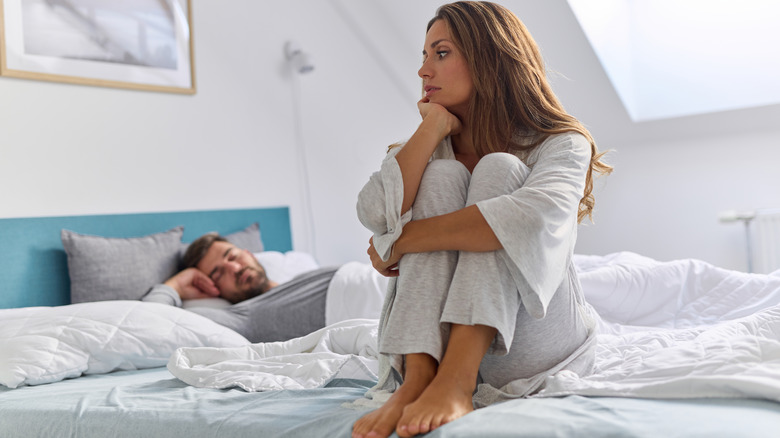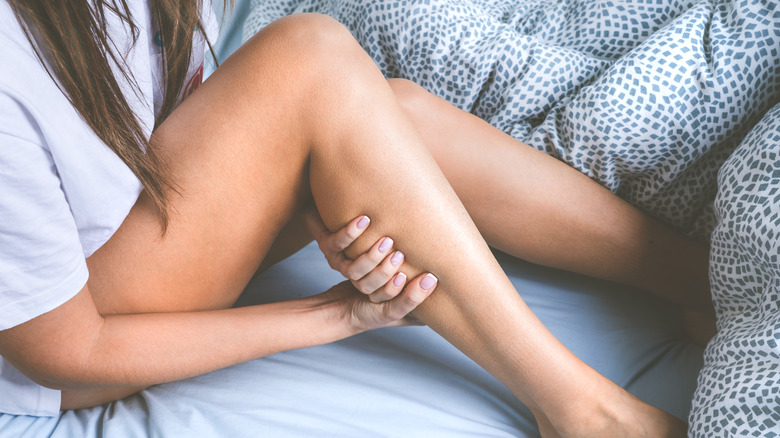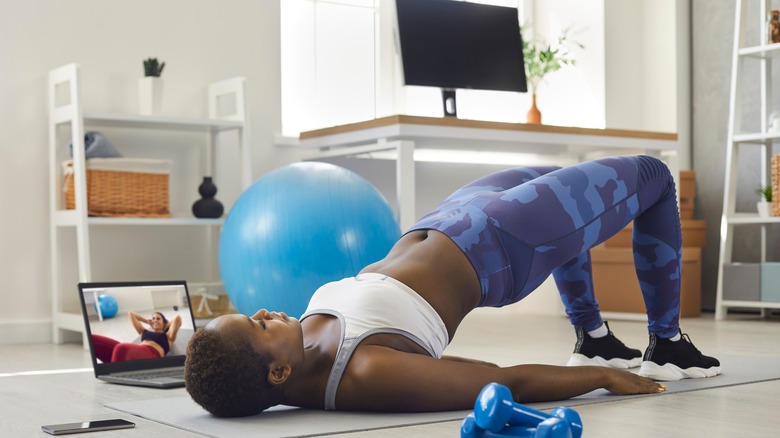What Happens To Your Muscles When You Stop Having Sex
Whether you're embracing celibacy, have a medical condition that makes sex painful, or you're not in a relationship and therefore abstaining till you find the right one, there are a few different reasons why people stop having sex.
But just like how having sex can do a lot for your body — like improve your immune function, lower your blood pressure, help you sleep better, and release stress — not having sex also has repercussions. When you stop having sex, you may notice that you're less frisky, you're not sleeping as well, you're anxious, or you're not getting that added exercise from intimate time with your partner. In a committed relationship, a cessation of sexual activity can create distance between you and your partner that could be challenging to bridge.
As it turns out, your muscles can also thank you for regular bedroom activity. Whether you're trying to ease sore muscles after a workout or dealing with arthritis pain, sex can be a natural pain-reliever. Hence, an inactive bedroom might mean more aches and pains.
How does sex help with muscle pain?
We already know what happens during sex when it comes to feel-good hormones. In addition to serotonin and dopamine, your body releases endorphins, when you have an orgasm. In fact, endorphins are also present before an orgasm when you're sexually aroused. Endorphins are your body's inherent analgesic chemicals. They work by blocking the nerve cells that receive pain signals from your body.
According to sex therapist Marty Klein, sex can be great for your muscles if you have osteoarthritis (per AARP). Osteoarthritis is a degenerative joint disease, and loss of flexibility, joint pain, and soft tissue inflammation are some of the symptoms. "Sex involves gentle, range-of-motion exercise, which minimizes pain and inflammation. It also releases endorphins, the body's natural pain relievers," shared Klein. "Sex strengthens the muscles around the joints, which helps support them[... and is] mood-elevating, which likewise helps alleviate pain."
That being said, if muscle pain is already a factor and you're experiencing discomfort in your back, neck, or shoulders, you may want to pay attention to your sex positions before getting intimate with your partner. Back pain might require having a neutral back position like missionary, shoulder pain might mean having sex in a way where you're not putting stress on your hands, and neck pain may necessitate spooning or another comfortable position for your neck.
Your pelvic floor muscles may weaken without sex
Pelvic floor muscles make up the muscles located between your tailbone and your pubic bone. Sex is thought to strengthen the pelvic floor, whether you're simply aroused or orgasming.
A 2021 study in Investigative and Clinical Urology examined 140 healthy women. It found that sexually active women were linked with higher pelvic floor muscle strength than ones who weren't. Stronger pelvic floor muscles mean better bladder function and reduced chances of leakage or incontinence. In fact, per female pelvic medicine specialist Dr. William Rush (via Premier Health), having sex regularly can help alleviate some of the symptoms associated with pelvic floor disorders. However, sex alone isn't sufficient. Health conditions that affect the proper functioning of your pelvic organs can cause prolapse and sagging of the organs. You could require a combination of pelvic floor exercises, medication, lifestyle changes, and sometimes even surgery to treat different conditions.
Along with Kegel exercises, sexually induced orgasm was seen as a valuable therapeutic tool when it came to increasing postpartum pelvic floor muscle strength and sexual function in first-time mothers, per a 2022 study in the Journal of Sexual Medicine. But not all experts think that sex increases pelvic floor strength. Per physical therapist Dr. Ashley Rawlins (via Origin), what happens during an orgasm (the contractions in your pelvic floor muscles) is reflexive, and doesn't measure up to performing targeted exercises to strengthen the area.



